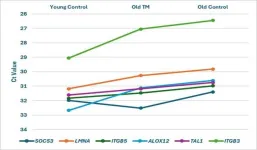(Press-News.org) Mental health care can be difficult to access in the U.S. Insurance coverage is spotty and there aren’t enough mental health professionals to cover the nation’s need, leading to long waits and costly care.
Enter artificial intelligence (AI).
AI mental health apps, ranging from mood trackers to chatbots that mimic human therapists, are proliferating on the market. While they may offer a cheap and accessible way to fill the gaps in our system, there are ethical concerns about overreliance on AI for mental health care—especially for children.
Most AI mental health apps are unregulated and designed for adults, but there’s a growing conversation about using them with children. Bryanna Moore, PhD, assistant professor of Health Humanities and Bioethics at the University of Rochester Medical Center (URMC), wants to make sure these conversations include ethical considerations.
“No one is talking about what is different about kids—how their minds work, how they're embedded within their family unit, how their decision making is different,” says Moore, who shared these concerns in a recent commentary in the Journal of Pediatrics. “Children are particularly vulnerable. Their social, emotional, and cognitive development is just at a different stage than adults.”
In fact, AI mental health chatbots could impair children’s social development. Evidence shows that children believe robots have “moral standing and mental life,” which raises concerns that children—especially young ones—could become attached to chatbots at the expense of building healthy relationships with people.
A child’s social context—their relationships with family and peers—is integral to their mental health. That’s why pediatric therapists don’t treat children in isolation. They observe a child’s family and social relationships to ensure the child’s safety and to include family members in the therapeutic process. AI chatbots don’t have access to this important contextual information and can miss opportunities to intervene when a child is in danger.
AI chatbots—and AI systems in general—also tend to worsen existing health inequities.
“AI is only as good as the data it’s trained on. To build a system that works for everyone, you need to use data that represents everyone,” said commentary coauthor Jonathan Herington, PhD, assistant professor of in the departments of Philosophy and of Health Humanities and Bioethics. “Unfortunately, without really careful efforts to build representative datasets, these AI chatbots won’t be able to serve everyone.”
A child’s gender, race, ethnicity, where they live, and their family’s relative wealth all impact their risk of experiencing adverse childhood events, like abuse, neglect, incarceration of a loved one, or witnessing violence, substance abuse, or mental illness in the home or community. Children who experience these events are more likely to need intensive mental health care and are less likely to be able to access it.
“Children of lesser means may be unable to afford human-to-human therapy and thus come to rely on these AI chatbots in place of human-to-human therapy,” said Herington. “AI chatbots may become valuable tools but should never replace human therapy.”
Most AI therapy chatbots are not currently regulated. The U.S. Food and Drug Administration has only approved one AI-based mental health app to treat major depression in adults. Without regulations, there’s no way to safeguard against misuse, lack of reporting, or inequity in training data or user access.
“There are so many open questions that haven't been answered or clearly articulated,” said Moore. “We're not advocating for this technology to be nixed. We're not saying get rid of AI or therapy bots. We’re saying we need to be thoughtful in how we use them, particularly when it comes to a population like children and their mental health care.”
Moore and Herington partnered with Şerife Tekin, PhD, associate professor in the Center for Bioethics and Humanities at SUNY Upstate Medical, on this commentary. Tekin studies the philosophy of psychiatry and cognitive science and the bioethics of using AI in medicine.
Going forward, the team hopes to partner with developers to better understand how they develop AI-based therapy chatbots. Particularly, they want to know whether and how developers incorporate ethical or safety considerations into the development process and to what extent their AI models are informed by research and engagement with children, adolescents, parents, pediatricians, or therapists.
END
My robot therapist: The ethics of AI mental health chatbots for kids
2025-03-31
ELSE PRESS RELEASES FROM THIS DATE:
Rice scientists pioneer method to tackle ‘forever chemicals’
2025-03-31
Rice University researchers have developed an innovative solution to a pressing environmental challenge: removing and destroying per- and polyfluoroalkyl substances (PFAS), commonly called “forever chemicals.” A study led byJames Tour, the T.T. and W.F. Chao Professor of Chemistry and professor of materials science and nanoengineering, and graduate student Phelecia Scotland unveils a method that not only eliminates PFAS from water systems but also transforms waste into high-value graphene, offering a cost-effective and sustainable approach to environmental remediation. This research was published March 31 in Nature Water.
PFAS ...
Exploring why some athletes perform better than others under stress
2025-03-31
Lack of sleep and stress hinder athletic performance, but some athletes may be better at performing competitively despite sleep issues and stress. In a new JNeurosci paper, researchers led by Yan Sun, from Peking University, looked for predictive behavioral and neural markers in athletes who maintain their performance level following sleep deprivation and under stress.
The researchers assessed college and professional athletes’ stress levels and cognitive changes after 24 h of sleep deprivation, then followed their ...
Exploring binge eating and binge drinking alcohol comorbidity
2025-03-31
The comorbidity of binge eating and alcohol binge drinking is prevalent and increases the risk of other neuropsychiatric and bodily conditions. However, the mechanisms linking these forms of binge consumption are unclear. To explore the link between binge eating and binge drinking alcohol, Karen Szumlinski, from the University of California, Santa Barbara, and colleagues developed a way to model the disease comorbidity in mice. As reported in their JNeurosci paper, this mouse model led to the discovery that females with a history of binge eating start binge drinking ...
The proportion of harmful substances in particulate matter is much higher than assumed
2025-03-31
People breathing contaminated air over the course of years are at greater risk of developing numerous diseases. This is thought to be due to highly reactive components in particulate matter, which affect biological processes in the body. However, researchers from the University of Basel, Switzerland, have now shown that precisely these components disappear within hours and that previous measurements therefore completely underestimate the quantities in which they are present.
From chronic respiratory problems to cardiovascular diseases, ...
Administration is weakening U.S. research capacity and endangering Americans, nation’s leading scientists warn
2025-03-31
The wellbeing of Americans and the country’s longstanding position as a world leader in science and technology are in jeopardy due to the actions of the Trump administration, approximately 1,900 leading figures in medicine, science, and engineering warn today in an open statement to the American public. The list of signatories includes Nobel Prize winners, deans of medical schools, and national leaders in science and technology.
“For over 80 years, wise investments by the US government have built up the nation’s research enterprise, making it the envy of ...
Trade Tariffs on Canadian Pharmaceuticals— Implications for US Drug Supply and Costs
2025-03-31
About The Study: Although Canada is not the largest supplier of medications to the U.S., tariffs could raise costs and strain supply chains. This study estimates that $3 billion in U.S. pharmaceuticals depend on Canadian manufacturing, with 25% tariffs adding $750 million in cost. Although the Inflation Reduction Act provisions limit cost pass-through to some payers (i.e., Medicare), manufacturers may still adjust production or alter distribution, increasing supply chain fragility.
Corresponding Author: To contact the corresponding author, Mina Tadrous, PharmD, PhD, email mina.tadrous@utoronto.ca.
To access the embargoed study: Visit our For The Media website ...
Cardiovascular Health Among Rural and Urban US Adults— Healthcare, Lifestyle, and Social Factors
2025-03-31
About The Study: This national cross-sectional study found substantial rural-urban disparities in cardiometabolic risk factors and cardiovascular diseases, which were largest among younger adults and almost entirely explained by social risk factors. These findings suggest that efforts to improve socioeconomic conditions in rural communities may be critical to address the rural-urban gap in cardiovascular health.
Corresponding Author: To contact the corresponding author, Rishi K. Wadhera, MD, MPP, MPhil, email rwadhera@bidmc.harvard.edu.
To access the embargoed study: Visit our For The Media website at this link https://media.jamanetwork.com/
(doi:10.1001/jamacardio.2025.0538)
Editor’s ...
Study finds gap between heart disease outcomes in men and women has narrowed over past 20 years
2025-03-31
While the typical image of someone suffering a heart attack might be a man clutching his chest, heart disease is a major problem for women, too. In fact, it’s the leading cause of death among women in the United States, with nearly 45% of the nation’s women over age 20 living with some form of cardiovascular disease.
A new study from heart researchers at Intermountain Health in Salt Lake City shows that while rates of death and other cardiac-related events – like heart attack – are still high for women, the ...
New study links lower proportions of certain sleep stages to brain changes associated with Alzheimer’s disease
2025-03-31
DARIEN, IL — New research reveals that lower proportions of specific sleep stages are associated with reduced brain volume in regions vulnerable to the development of Alzheimer’s disease over time.
Results show that individuals with lower proportions of time spent in slow wave sleep and rapid eye movement sleep had smaller volumes in critical brain regions, particularly the inferior parietal region, which is known to undergo early structural changes in Alzheimer’s disease. The results were adjusted for potential confounders including demographic characteristics, smoking history, alcohol use, hypertension, and coronary heart disease.
“Our findings provide ...
Long-term practice of Transcendental Meditation may reduce both stress and aging
2025-03-31
A collaborative study conducted by researchers at Maharishi International University (MIU), the University of Siegen, and the Uniformed Services University of the Health Sciences reveals that individuals practicing Transcendental Meditation® (TM®) technologies long-term show favorable biological markers of aging and stress. The research compared gene expression, cognitive function (via EEG), and hair glucocorticoids (cortisol and cortisone) in 12-year and 40-year TM groups and non-meditator controls.
“This study provides evidence that long-term practice of TM technologies has a broad range of health benefits at the molecular ...

